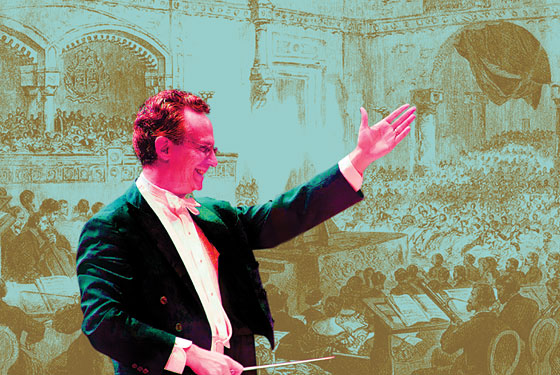
This is the year of the interregnum. City Opera and the Brooklyn Philharmonic are both bouncing from venue to venue in search of a future. The New York Philharmonic is hunting for a chief executive to replace Zarin Mehta, who plans to retire. And at the colossus of performing-arts institutions, the Metropolitan Opera, the ailing James Levine is absent but still nominally in charge of music, as Fabio Luisi, the man who would be chief, remains a stopgap lieutenant. In a business where searches for top jobs can drag on for years, Luisi has become the Met’s music director by default. He is a musician of immense and varied skills, but his greatest asset has been his presence. He has canceled appearances, moved to the Upper West Side—whatever it took to be available whenever Levine wasn’t, which this season has been always. He’ll step up again for Götterdämmerung in January and is no doubt standing by for the complete “Ring” in April.
Luisi is handling a tricky situation with aplomb. Orchestra members say they respect his professionalism and musicianship. He runs rehearsals with efficiency and warmth. He is, by all accounts, a mensch. Yet from the outside, it’s hard to say who’s directing the musical operation. And “it’s not easy to understand from the inside either,” he says during a recent conversation. “You have a music director who for 40 years has always been present. Now, since Jimmy’s not here, the orchestra brings me technical questions. Sometimes the administration invites me to sit in on auditions.” But he is not in charge, and waits to be asked for his opinions.
Audiences have had plenty of opportunities to gauge his ability to pull off distinguished performances in treacherous conditions. Seated at the harpsichord, Luisi conducted a Don Giovanni this fall in which the baritone Peter Mattei, a late substitution for the injured Mariusz Kwiecien, jumped into the title role with minimal rehearsal. The staging was a prematurely dusty thing, but Luisi kept the score supple, relentlessly sprightly and eye-wateringly clear. A few weeks later, he led Wagner’s Siegfried, another clunker—Robert Lepage’s flapping aluminum machine has worn out its welcome long before the gods’ downfall—and again had to work with a last-minute substitute in the title role. Yet he kept the music as fleet and effervescent as a five-hour Wagner opera can be.
If indeed Luisi takes over, I will miss the volcanic energy boiling beneath glacial tempos in Levine’s Wagner, the crescendos hurtling explosively, the orchestra’s hot-iron-wrapped-in-ermine sound. In the scene in Siegfried when the hero hammers out his sword, Levine always gives the cellos’ and basses’ every dum-da-dum a martial energy; Luisi makes them bounce. Levine exposes the score’s powerful girders; Luisi brings out the surface’s delicate craquelure.
So there are four possible scenarios for the near future:
• A rested and reinvigorated Levine returns to lead the Met for another decade; Luisi, left at the altar, moves on.
• Levine resigns as music director, but returns periodically as guest; Luisi is appointed his successor, effective immediately.
• Levine resigns, but the Met makes a surprise choice: Riccardo Muti? Daniel Barenboim? Antonio Pappano? All unlikely.
• The current situation drags on. The disturbing thought is that the Met’s general manager, Peter Gelb, might actually like the status quo, since uncertainty leaves him unchallenged. Gelb’s fund-raising virtuosity and marketing prowess need to be balanced by an artist’s voice—especially at an opera company that recruits directors from the outside worlds of theater, art, architecture, and film. As Luisi himself remarks diplomatically, “Some directors don’t have faith in the music.” Levine’s successor needs the clout to defend it.
